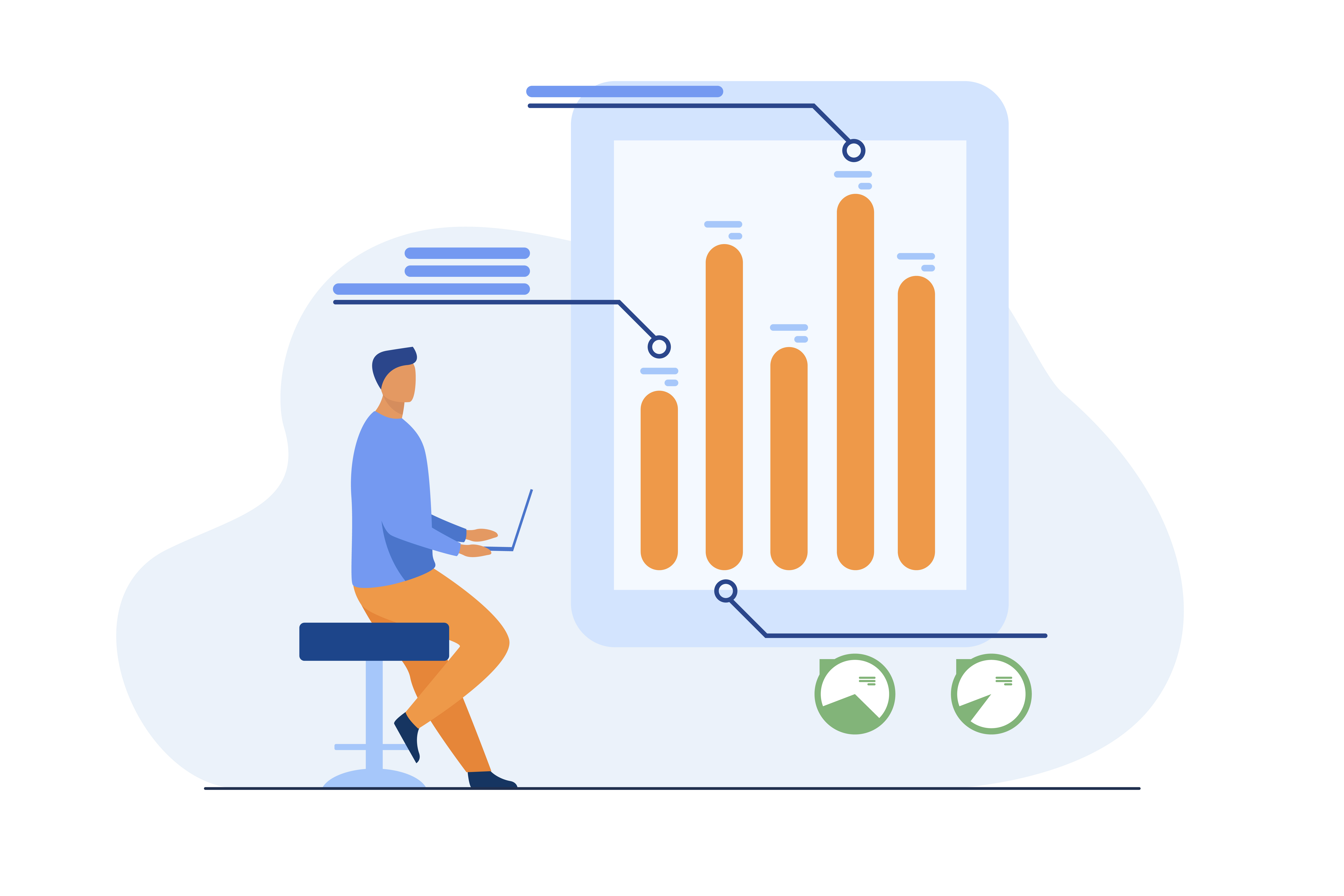Is your FinTech company in need of data analytics outsourcing?
By
Last Updated April 24, 2023
"Data is everything," is a well-worn adage that applies to every industry, not just FinTech or Financial Services. However, the true power lies in the ability to transform raw data into tangible, actionable insights. What would it mean for your FinTech company if you could process every piece of data almost instantly and use it to improve customer experience and build better products faster than your competitors? That is what data analytics does for your company.
Since the digital transformation of FinTech, businesses have effectively used insights gained through data analytics reports to reduce customer churn, prevent accidents, and predict and prevent financial fraud and failures. Because of big data, FinTech has grown its operations by incorporating cutting-edge technologies such as the Internet of Things (IoT), Blockchain, and Artificial Intelligence/ Machine Learning (AI/ML), Smart data discovery. These are the main reasons why SMBs and enterprises prefer data analytics outsourcing.
Outsourcing is a low-cost strategy that enables startups, SMBs, and established enterprises to manage their day-to-day operations more effectively by leveraging analytics expertise and curating data with their brand. In the following section, we will discuss the benefits and drawbacks of outsourcing data analytics, as well as how your FinTech company can outsource data management services.
First, consider the role of big data analytics in FinTech in general.
Big Data's Role in FinTech
The FinTech industry is expected to reach $28529.29 billion by 2025, growing at a CAGR of 6%. The increased use of mobile devices has resulted in an increase in the number of customers using FinTech products and services of some kind or another. Users have an exponential increase in data produced every second as these interactions and usage patterns are stored over time.
Most FinTech companies face both challenges and opportunities as a result of this.
If your FinTech company lacks the ability to use this massive amount of data to better serve your customers, you are setting yourself up for failure. Advanced data analytics and smart data discovery capabilities, on the other hand, can work wonders for your FinTech organisations.
According to a survey, more than 66 percent of your customers expect you to understand their expectations, and this is especially true in the FinTech industry. Indeed, 71% of FinTech users now expect more flexible journeys with multi-channel interactions.
Big Data Analytics Role
You can use this data to create customised products and features for your customers if you have the necessary Data Analytics infrastructure.
In a nutshell, (Big) Data in FinTech can assist with:
- Better customer segmentation allows for more customer-centric products and services.
- Improve your fraud detection and risk management procedures.
- Improve your operational performance while lowering costs.
- Stand out by accurately forecasting customer behaviour and conducting sophisticated risk assessments.
- Providing agile digital solutions by leveraging consumer data
Big data solutions from Syoft:
(Big) Data Analytics Applications and Use Cases in FinTech
Big data applications in online banks, FinTech startups, and established financial institutions go beyond simply converting data into valuable insights. Big data analytics can be used actively in the FinTech industry for a variety of purposes. Let's look at a few examples of how combining big data analytics with modern technologies can benefit your FinTech business.
1. Insurance and big data
Insurance companies have traditionally relied on obsolete statistical and demographic data. They were forced to use manual pricing on their policies, resulting in significant financial losses. Modern insurance companies use big data to create low-risk products.
For example, many car insurance companies estimate risk and adjust policy offers based on on-the-ground data and road accident statistics.
2. Analytics of big data in digital payments
Big data and machine learning are actively used in FinTech for fraud detection and security control. The most recent digital transformation trend in online payments is the combination of payment processing and sales, allowing users to obtain loans in seconds. The online mechanism assesses risk and the amount of credit available to the customer by combining machine learning algorithms and big data. This has resulted in higher conversion rates for a variety of FinTech businesses.
Various financial payment companies, for example, target young professionals and assist them in investing, saving, and managing finances effectively and securely.
3. Technology based on big data
Real estate requires continuous market monitoring, dynamic pricing, and comprehensive property information in order to sell more with a higher margin. This includes gathering data from various sources and analysing it to make the right offers to the right customers. As a result, big data analytics can help you reduce the risk of customers defaulting on payments.
4. The use of big data in lending
AI models and Big data analytics can be widely used in microfinance and other lending businesses to make credit loans more accessible to a wider range of people. This provides you with two advantages. First, your FinTech business would promote financial inclusion among your target audience, and second, loan adoption would increase your FinTech business's revenue.
Furthermore, the increased availability of instant loans boosts the economy and assists other businesses in growing dynamically
5. Wealth management using predictive data analytics
One area where predictive data analytics could be used to bridge the gap between business expectations and customer expectations is wealth management. The valuable customer data can be used to create more detailed customer profiles. Data also aid in customer retention; for example, you can make personalised offers for various demographics ranging from college loans to retirement plans.
Not only that, but predictive data analytics improves customer segmentation, enables the delivery of more customer-centric products and services, and optimises operations. This is most likely why businesses of all sizes use data analytics services to improve their entire customer experience.
Now that we understand how valuable data analytics insights can be, Let's look at why you should outsource data management services for your FinTech company.
Why Does Your FinTech Company Require Data Analytics Outsourcing?
Fintech big data analytics:
Effective data analytics necessitates cutting-edge technology that is tailored to your FinTech organization's specific needs. But, if you're still unsure about how outsourcing data analytics technology can help, consider the following:
1. Expertise: As a financial service or FinTech company, you understand the nuances of providing exceptional services in your domain. Seeking the necessary technical expertise in data analytics saves you the trouble of entering a completely different vertical with little to no experience.
2. Cost-effectiveness: It is true that outsourcing has associated benefits such as cost savings and faster project delivery. Data analytics outsourcing is no exception. With big data outsourcing, your FinTech company can save a lot of money on operational costs.
This also reduces the overhead costs associated with maintaining an in-house development team, such as social security tax and payments.
3. Scalability: Data analytics outsourcing in FinTech provides you with the adaptability, speed, and agility required to outperform your competitors. This factor not only allows you to keep your development process running smoothly, but it also helps your business achieve global reach in the long run by providing stability.
4. Product variety: When you outsource your business data demands and goals, your outsourced team is more likely to provide you with more than one solution. It is easier to select the most viable solution from a pool of reliable results.
5. Customized data analytics solutions: The finance industry as a whole is well-established.By outsourcing your finance needs, you gain access to customised FinTech software solutions that allow them to thoroughly analyse customer sample data. The software solutions increase sales and foster customer loyalty. This allows you to carefully monitor each prospect, from credit scores to user purchasing patterns.
Furthermore, data analytics outsourcing firms are more likely to respond to every minor detail of your business demand. However, each business aspect has its own set of advantages and disadvantages. How about we go over some of the major advantages and disadvantages of big data outsourcing?
Pros and Cons of Outsourcing Data Analytics:
As a fintech business owner, you must consider not only the great opportunities but also the potential risks when it comes to data analytics. A thorough understanding of the benefits and drawbacks will enable you to assess the situation more accurately.
The Benefits of Outsourcing Data Analytics in FinTech:
-
Recruiting competent personnel
The tech team you hire will be experienced professionals in their field. They are more likely to handle highly specialised tasks and business requirements that are critical to your FinTech development. Furthermore, according to one study, outsourced members are 41 percent more reliable when it comes to delivering results on time. This demonstrates nothing but a capable team working for you.
-
Access to cutting-edge technology and practices
Most FinTech startups and enterprises cannot afford to provide their data management teams with cutting-edge technology. A reliable outsourcing company that provides data analytics services would be ideal.
-
Concentrate on customer-centric services
Customers today expect businesses to understand their expectations, needs, and demands. An outsourced team relies heavily on customer research data and implements comprehensive holistic strategies to create a product that addresses user needs from every angle. This enables you to provide more customer-centric services and solutions.
-
New possibilities
Innovative technologies provide tremendous opportunities and advantages to financial institutions. Real-time payment processing, cloud computing, wealth technology, cryptocurrencies, blockchain, chatbots, advanced analytics, and so on are examples. Consider how many solutions you can implement for your company using these technologies. Outsourcing technology is thus a reasonable benefit for exploring such new technologies and expanding the scope of your financial enterprise.
Read more about the Bajaj Finserv onboarding process
The disadvantages of outsourcing data analytics:
Except for a few factors that can be overcome, there are no major disadvantages to data analytics outsourcing.
-
Misinterpretation of business objectives
Your FinTech company may have nuances that need to be clarified with your outsourced team. The best solution is to hire a service that specialises in your industry.
-
Leak of information
It is critical to ensure that your data analytics outsourcing company protects your data and prevents unauthorised access. This can be avoided by signing a nondisclosure agreement with the company.
This brings us to our final section.
How to Pick the Best FinTech Development Outsourcing Firm?
Outsourcing FinTech requirements is now more of a requirement than an option. While you're at it, make sure to learn how to outsource data analytics Here are a few important things to remember when outsourcing.
1. Professional experience
The most important factor to consider is proven experience in developing high-quality FinTech solutions. Take note of previous FinTech projects on which the company has worked, as well as their success rate. The outsourced company's portfolio must ensure dependable services, simple integrations, and ongoing maintenance of data analytics solutions.
2. Security
Another critical factor to consider when outsourcing FinTech data analytics is security identification and authentication. FinTech is one industry that necessitates extreme precision and safety in all operations and data. As a result, ensure that your outsourced team prioritises security rather than treating it as an afterthought.
3. Risk reduction
Risk management is a process. Not to mention that your company's data is at stake; therefore, make sure that your outsourced team has a backup plan in place in case your primary development plan fails.
Syoft can assist you with FinTech Data Analytics Solutions:
As the big data analytics outsourcing market in FinTech grows in popularity, it's safe to assume that it will soon become the lifeline of prominent startups and enterprises. Your FinTech organisation will be more adept at providing seamless service across all channels with the help of big data. Syoft has successfully delivered data management solutions over several years of development.
We can provide custom data analytic services for your FinTech company.
Recent Posts
Get a Free Quote.
Lets Build Your App!
Connect





